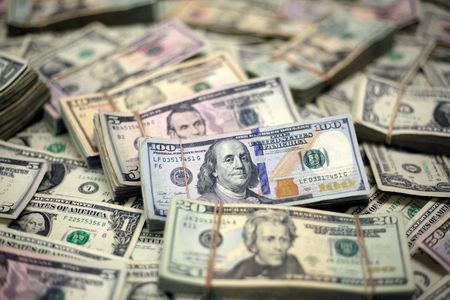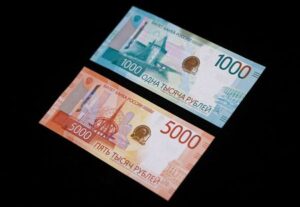By Kevin Buckland
TOKYO (Reuters) – The dollar slid to a one-month trough versus the yen and a one-week low on the euro on Friday, as a mixed bag of U.S. job market indicators stirred caution ahead of a crucial monthly payrolls report later in the day.
A report on Thursday showed the number of Americans filing new applications for jobless benefits declined last week as layoffs remained low. That helped allay fears that the labour market was deteriorating rapidly, after figures released the previous day showed private jobs growth slumped to a 3-1/2-year low in August.
Traders currently see 41% odds for a super-sized 50-basis point (bp) Fed interest rate cut on Sept. 18, versus 59% probability of a quarter-point reduction, according to the CME Group’s FedWatch Tool. A day earlier, wagers on the larger cut stood at 44%, but a week ago it was 30%.
The mixed data leaves traders guessing before Friday’s payrolls print, with economists surveyed by Reuters predicting an increase of 160,000 jobs in August, up from a 114,000 rise in July.
“Payrolls number will likely come out on the weaker side, as most economists submitted their forecasts last week without seeing these leading indicators,” said Shoki Omori, chief Japan desk strategist at Mizuho Securities, pointing to the private jobs report in particular.
“I see a negative outcome, (but) of course if the overall print comes out strong, recent history tells us that USD/JPY can jump up roughly 80c,” to around 144 based on current levels, he said.
What the Fed makes of the payrolls numbers will be almost immediately obvious, with both Governor Christopher Waller and New York Fed President John Williams separately taking to the podium in the final Fedspeak before the blackout period begins ahead of this month’s policy gathering.
Fed Chair Jerome Powell signaled the central bank’s focus was shifting from fighting inflation to preventing deterioration in the jobs market when he strongly endorsed an imminent start to the monetary easing cycle at the annual economic conference in Jackson Hole last month.
“Recent labor data has fanned fears of labor market softening (and) the August payroll report could be a ‘make or break’ moment,” TD Securities analysts including head of global strategy Rich Kelly wrote in a report.
However, TD expects 205,000 jobs were added in August, setting up a quarter point cut this month, and triggering a dollar rebound.
“There is simply lots of bad news priced into the USD, increasing the risks that a string of good news will kick-start a sizeable correction.”
The dollar dropped 0.7% to 187.63 yen as of 0540 GMT, the weakest level since Aug. 5. A continued slide in long-term U.S. Treasury yields to a one-month trough of 3.708% heaped pressure on the currency pair.
The euro held its ground at $1.11145, just below Thursday’s high of $1.11195, the strongest level since Aug. 29.
Sterling was little changed at $1.3172, sticking close to the overnight top at $1.31855, its highest since Aug. 30.
The dollar index, which gauges the currency against the yen, euro, sterling and three other major peers, slipped 0.1% to 100.94, a one-week low. For the week, it has dropped close to 0.8%.
The Swiss franc, which like the yen is a traditional haven currency, strengthened about 0.26% to 0.8422 per dollar.
The risk-sensitive Australian dollar eased 0.24% to $0.6725.
Leading cryptocurrency bitcoin rose 0.8% to $56,520, attempting to recover from its slump to a nearly one-month low of $55,575.78 this week.
(This story has been corrected to fix the jobs estimate to 160,000, not 165,000, in paragraph 4)
(Reporting by Kevin Buckland; Editing by Shri Navaratnam and Kim Coghill)





